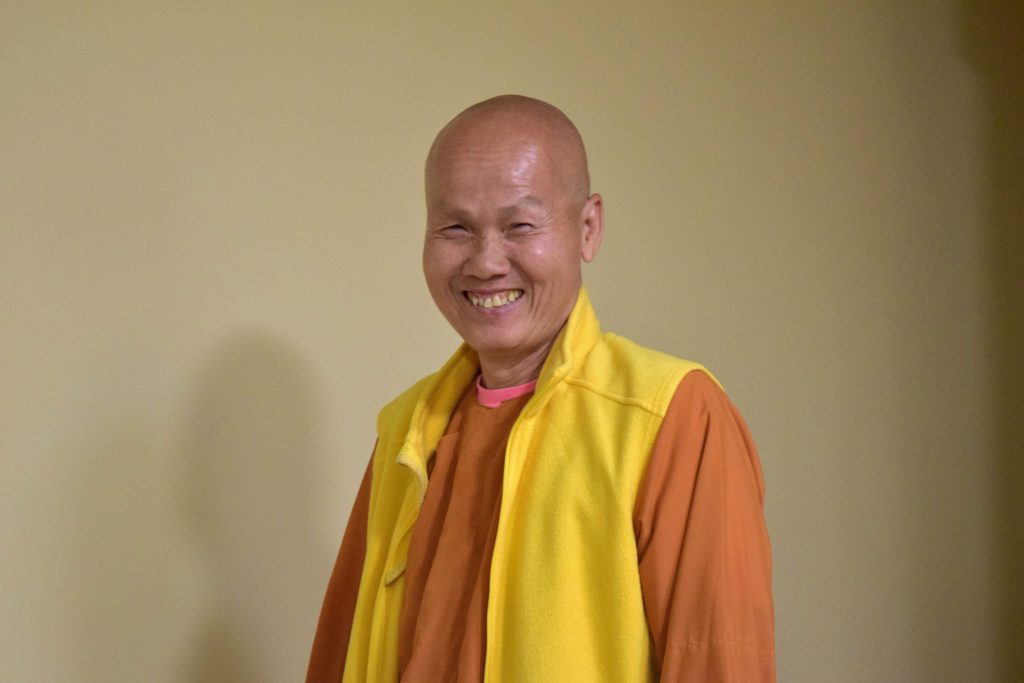When I was 5 or 6 years old, I started worrying about life and the end of the world, so I tried to find a way to survive. I decided that the solution is giving. I tried to give rice, money, or whatever I had to people in need. When I had money, I often went to the market and bought food, which I would then give to the people. It made them happy, and this made me happy. My father didn’t want me to do this because he thought if I continued like that, I would become a monk, instead he wanted me to have a regular life, get married and start a family.After I actually did become a monk, I lived at a monastery in Vietnam. There, I practiced by myself, with my Dharma brothers, and I participated in retreats. Later, I lived in other monasteries for some time, and I also practiced by myself in the forest. But I wanted to get to know other places, traditions and people, so I decided to travel. I was curious to find out how others practiced, and how they open their heart with compassion. First, I traveled to many provinces in Vietnam, and then I wanted to go to the United States, Europe and other places in the world to see how Westerners share their own tradition and compassion.
When I traveled in Vietnam, I sometimes ran out of gas, or had no more money, so I started to worry a little bit. But then I thought to myself, why worry, I shouldn’t worry too much. So, I simply stopped worrying. And in the end, there was always somebody who would donate some money or bought gas for me.
Before I started traveling internationally, I prepared myself by reading books about explorers. I read many stories about people who traveled in the past, like some Chinese monks who traveled to India, a Japanese nun who traveled around the world, etc. When I first arrived in the United States, I traveled by bus from city to city. I didn’t know English, and at that time I was not yet familiar with the Google Translator App. I met many people on the bus, and although there was a language barrier, people understood me from heart to heart. People welcomed me like a friend, like a family member. They even invited me to stay in their homes. This helped me not to worry when I changed my mode of transportation. People are the same everywhere. They might have a different physical appearance, but I believe that in our hearts we are the same.
During my travels in the United States I have learned that people here know and are influenced by Buddhism. They know about the different traditions of Buddhism and different teachers like Venerable Thich Nhat Hanh and the Dalai Lama. All the people I have met so far have reacted with kindness. They recognize that I am a Buddhist monk by the clothes I wear. My language is very limited, but with modern technology like the translation app in my phone, and of course by my own action, I try to share the core of my practice with the people I meet. I try to guide them, I teach them how to breathe, and I talk about the Zen tradition, the way I learned it from my master.
While in the United States, I am also visiting the monasteries of my Dharma brothers, monks who have the same teacher as me. I share the pictures and stories from my travels with them.
This is a big trip for me, and I don’t believe I will take another trip like this in the future. I feel my virtue as a monastic allows me to travel and learn something new. There seems to be a lot of violence in modern Western society, like the school shootings, and I would like to look into the causes for this.
You ask if I ever feel lonely. In Buddhism we don’t use the word loneliness. Even if I stay in a forest by myself, I am not lonely because I am connected with nature. And the practice in a monastery with dharma brothers gives us energy to link together, it reduces the seed of loneliness inside of us. Whether by myself on a mountain in Colorado, or in a monastery with a lot of other people, I never feel lonely.
In memory of Venerable Thích Bình Đẳng, who passed away on 10/23/2019 from injuries incurred during a motorcycle accident in Wyoming, USA


